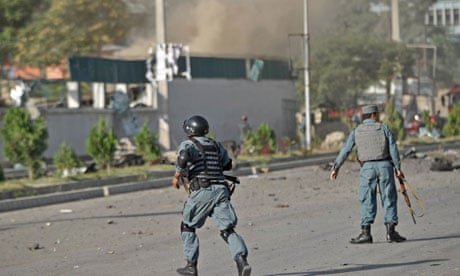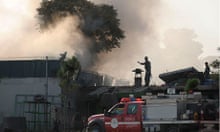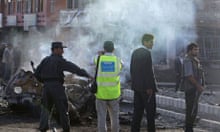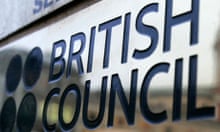The attack on the British Council in Kabul will inevitably challenge two key planks of the official narrative about the war in Afghanistan: that the insurgents are becoming less capable as they are clobbered on the battlefield and that the Afghan security forces are rising to the challenge of taking over the full task of defending their country by the end of 2014.
Last year, there were indeed signs that when it came to urban terrorism the insurgents were losing their touch. A long stretch without attacks in the city was hailed by David Petraeus, the then commander of the US-led mission, as a sign that his strategy was making progress in protecting a province where a large chunk of the Afghan population lives.
When attacks did pick up, they included the bombing of an upmarket supermarket and a shopping centre that only succeeded in killing Afghan civilians, in the latter just the guards on the front door. Many analysts suggested that the "Kabul attack network" was increasingly reliant on incompetent fighters to execute attacks and on civilian targets that were likely to outrage ordinary Afghans.
But in recent months the Taliban and the Haqqani network – a vicious ally of the Taliban with close links to al-Qaida – have shown that their power to wreak havoc is undimmed.
They have repeatedly proven themselves able to field sizable teams of apparently well-trained suicide fighters who are able to approach, undetected, key targets in and around the capital and do huge damage.
The June attack on Kabul's Intercontinental Hotel and last week's assault on the office of the governor of Parwan, just 45 minutes' drive from the capital, all followed the same pattern as the British Council attack: initial suicide detonations take out the first layers of security allowing other attackers to swarm inside, killing as many people as possible with small arms and bomb vests.
All these so-called complex attacks took place in a city where security was "transitioned" from international to Afghan control back in 2008.
William Patey, the British ambassador, pointedly said the military response to Friday's attack was carried out by a Crisis Response Unit, an elite Afghan unit that is only "mentored" by foreign forces.
But as with June's complex attack on the Intercontinental Hotel, it appeared to onlookers that it was the foreign mentors, in this case the New Zealand SAS, who did much of the heaviest lifting. As with the hotel attack, they also paid a greater price than their Afghan colleagues. In June, two New Zealanders were injured. On Friday one was killed.
The Afghan government and the international community are currently working on a "transition" strategy whereby the Afghan army and police will have full responsibility for security across the country by the end of 2014.
A residual foreign force is likely to remain, although it is hoped in a largely non-combat role.
To be completely independent of foreign assistance Afghan special forces, already a generally admired force, would have to become even more capable than they are already.
That is, frankly, unlikely to happen. With the Taliban and their allies likely to persevere with audacious attacks which are by their nature extremely difficult to counteract, most western officials acknowledge that even after 2014 elite foreign forces will have to be on hand for many years to come.




